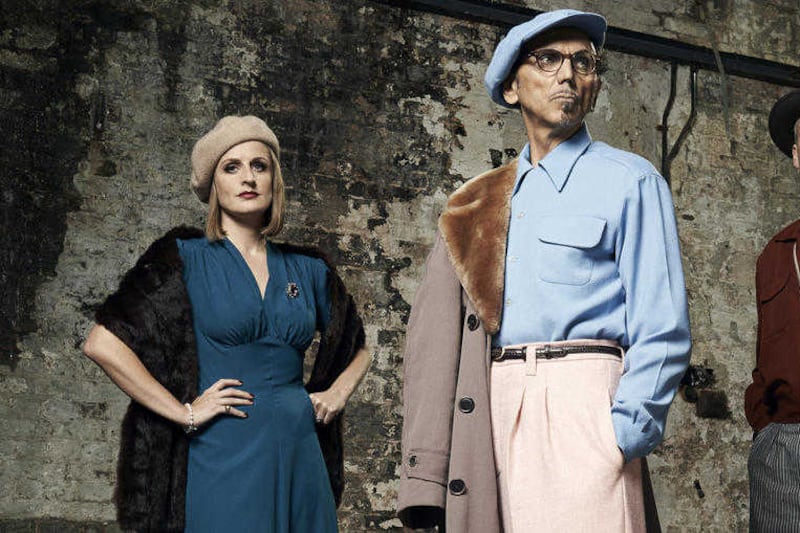THIRTY ONE years in the making, Kevin Rowland has finally realised his vision of recording an album of Irish tracks.
It was around the time of Dexys Midnight Runners’ 1985 testament Don’t Stand Me Down that lead singer Rowland first "felt the desire" to do an album of Irish songs.
"That was the plan, but we broke up and didn’t get round to it. And then there was never a right time," he reflects.
When 'Dexys' re-emerged in 2012 with their theatrical One Day I’m Going To Soar, Rowland, never one to do the predictable, decided he didn’t want to follow that up with something similar and that the time was right to tackle the Irish album.
As always with Dexys, there is more than one layer and the album evolved to become an unlikely hybrid of Irish ballads and other favourites of Rowland's, which as he puts it "loosely fall under the heading 'country soul'".
These includes Joni Mitchell’s Both Sides Now, The Bee Bees-penned To Love Somebody, Rod Stewart’s You Wear It Well and How Will I Live, a former hit for LeAnn Rimes.
But it's the traditional Irish songs on Let The Record Show Dexys Do Irish and Country Soul – Women of Ireland, Curragh of Kildare and I'll Take You Home Again, Kathleen, which resonate most deeply with Rowland.
"Them songs are in my psyche – I've know them so long," says Rowland who spent the first four years of his life in his parents' native Co Mayo, before moving to Wolverhampton.
Rowland’s Irish roots have always shone through in his music, from the cover of Searching for the Young Soul Rebels, which featured a young boy clutching his possessions after his home had been burned down by a sectarian mob in Belfast, to the Celtic gypsy-soul of their 1982 album Too-Rye-Ay.
He has fond memories of impromptu sessions at his home when friends and family visited.
"They'd go to the pub, come home and sing these beautiful Irish ballads unaccompanied. They sounded so pure."
Does he believe this early introduction to music influenced him becoming a musician?
"It was pop music which really influenced me at the beginning, but these songs are inside me. That’s why I can sing them now."
Adamant it's not a covers albums, Rowland and the eight-piece band which accompanies him have put their heart and soul into every track – none more so than in the recording of Carrickfergus, which produced a soul-bearing intensity he never experienced before.
Before recording the song, Rowland recalled stories that his father told him of the “long-distance men” that he encountered back in the 1940s and 50s. These Irish labourers would trek from city to city to find work, during which they’d often sleep rough and exist on a boozy diet. Frequently they would die young after suffering from tuberculosis. Their stories and that of the song’s central character are clearly related.
“After the first few takes [of Carrickfergus], something happened in me. I felt my body becoming weak and hunching over. I felt cold, so I put my collar up. I actually felt as though I was becoming the character in the song. As I sang it, I felt I was that person. I recorded the vocal in one take and halfway through it I coughed. I later realised that the cough seemed to come about because I was so immersed in the character of the song. So we kept it exactly as it was delivered.”
"I don't remember having a reaction like that before with any of my songs. I don't know what made me wear those old clothes, cap and overcoat. It was intuitive."
Fashion and style have always been a crucial facet of Rowland’s vision for Dexys. The album cover of Let The Record Show Dexys Do Irish and Country Soul is clearly stylised in a vintage/retro style.
"I'm loathed to describe my style; it's fluid and always changing. Style is content," says Rowland, who admits to have two bulging wardrobes and to be "constantly looking" for new, and old, designs.
Although in the past he has criticised the quality of Irish albums, Rowland believes that music from this island has progressed immensely.
"That was in the early 80s when I believed I could do better. There was a perception that Irish people were looking to Britain or America musically. There's been lots of great Irish artists subsequently," says Rowland, who praises Co Cavan singer Lisa O'Neill, whom he saw play live recently.
Although harp is used in the opening to The Town I Love So Well, Dexys deliberately avoided the use of traditional Irish instruments. The title was Dexys 'Do' Irish and Country Soul not 'become' it,” he emphasises."We’re bringing our own style to these songs. I’m just a guy who follows my intuition, my inspiration."
And how did he approach singing this Phil Coulter song?
"In the early verses I imagined Wolverhampton and all the derelict buildings we used to play in as a kid. Then later on I thought about when I visited Belfast and Derry in the 80s. I'd love to meet Phil Coulter one day as I think The Town I Love So Well is an amazing song."
Rowland admits he never switches off from his music – even in his sleep, constantly listening to songs and thinking what he could do with them.
"I do wake up in the middle of the night with an idea and have to write it down or put it on a tape."
In the opening of Curragh of Kildare, Rowland speaks the words rather than singing them.
"I was looking for a way to make the first verse sound more interesting, then I thought, 'No talk – it it will be good'."
The band recently performed in a special Imagining Ireland concert in London's Royal Festival Hall as part of the Easter Rising celebrations.
"I had my family there and met the Irish president. It was quite powerful for a boy who left school at 15, a bit of a no-hoper."
Although they have no plans to tour the album, Rowland is hopeful of playing again in the north and top of his agenda is a visit to the town of Carrickfergus.
And what's next musically?
"I don't know. I'm glad we done this album. Who knows what the future holds?"
As always with Kevin Rowland it's a case of await the unexpected.
:: Let The Record Show Dexys Do Irish and Country Soul is out on June 3 on 100% / Warner Music. Visit dexysonline.com.




